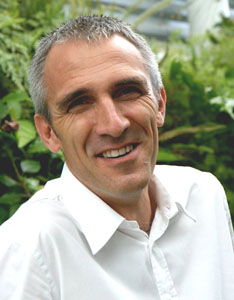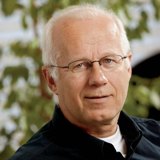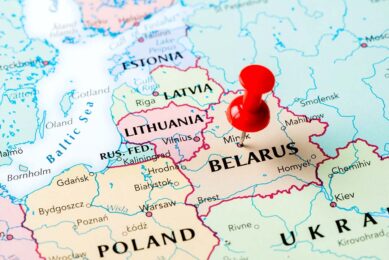Groupe Grimaud president Frédéric Grimaud: “A dream come true”

Five years after the takeover of Hubbard, Frédéric Grimaud, president and CEO of French company Groupe Grimaud can proudly say that his dreams came true. With his team he turned a loss making company into a sustainable farming operation.
By Wiebe van der Sluis
When in 2005 the announcement was made that a “small French duck breeding company” had taken over all assets of Hubbard, the third largest broiler breeding company in the world, everybody in the poultry industry frowned. It was often questioned how in the world such a small duck company dared to buy such a loss-making broiler giant?
The answer is simple. Grimaud was not as small as many had thought and it had ambitions. The company had a turnover of 68 million euros of which 80% came from duck and rabbit breeding and 20% from genetics. Besides the duck and rabbit business it was also active in biotechnology and pharmaceuticals with a focus on life science and especially how to apply it in genetics.
Bio-pharmacy
Early 2000 the Grimaud company initiated its biotech research through looking at possibilities on how to use embryo stem cells in improving poultry traits. It discovered several possibilities for breeding and pharmaceutical purposes and patented them. That initiated the founding of Vivalis, which develops innovative technology for the production of vaccines and pharmaceutical proteins. Meanwhile Vivalis became listed on Euronext and the world’s largest pharmaceutical companies acquired licenses to develop vaccines based on the Vivalis discoveries.
Early 2000 the Grimaud company initiated its biotech research through looking at possibilities on how to use embryo stem cells in improving poultry traits. It discovered several possibilities for breeding and pharmaceutical purposes and patented them. That initiated the founding of Vivalis, which develops innovative technology for the production of vaccines and pharmaceutical proteins. Meanwhile Vivalis became listed on Euronext and the world’s largest pharmaceutical companies acquired licenses to develop vaccines based on the Vivalis discoveries.
Besides licensing its know-how, Grimaud started its own biopharmaceutical business, “Filavie”. It offers a range of autogenous vaccines against bacterial pathogens to the animal production sector.
It’s a farming business
Groupe Grimaud is a family owned company headed by Frédéric Grimaud. He is an entrepreneur with a strong will to be an important player in the animal genetic and biotech business. “My focus is on organic growth and takeovers”, he says when speaking with him. “It has always been my dream to become a major shareholder in a chicken breeding company. Since the duck business is not growing that much any more, I had to look at other opportunities”, he continues.
Groupe Grimaud is a family owned company headed by Frédéric Grimaud. He is an entrepreneur with a strong will to be an important player in the animal genetic and biotech business. “My focus is on organic growth and takeovers”, he says when speaking with him. “It has always been my dream to become a major shareholder in a chicken breeding company. Since the duck business is not growing that much any more, I had to look at other opportunities”, he continues.
“We approached Merial a long time ago to ask whether they were interested in selling Hubbard. Initially they did not want to sell, but changed their mind in 2005. We believed that we would be able to turn the loss making company into a profitable business. The main reason for this is that we look at poultry breeding from a farming perspective and not from a stockholders or pharmaceutical viewpoint. Livestock breeding is by definition a farming business and requires a specific management strategy and mentality”.
Selection for customers needs
“As soon as we had taken over all assets of the Hubbard company, we started restructuring the US base and moved the headquarters in France from Lyon to Brittany. We reviewed the gene pool, the market and our customers. This resulted in a change in focus. All historically in-company built villages with separate disciplines were broken down and merged into one big true family. The selection principle became totally custom driven, instead of conducting genetic selection for the sake of science.
“As soon as we had taken over all assets of the Hubbard company, we started restructuring the US base and moved the headquarters in France from Lyon to Brittany. We reviewed the gene pool, the market and our customers. This resulted in a change in focus. All historically in-company built villages with separate disciplines were broken down and merged into one big true family. The selection principle became totally custom driven, instead of conducting genetic selection for the sake of science.
“Through creating stability in the products by using less genetic lines we were able to quickly improve our genetics generation by generation. One of the main results is that today we service 40% of the US male breeder market, which in 2005 was zero. Another promising example is Brazil, where the Hubbard Flex is now the most efficient solution for broiler production.”
“Meanwhile Hubbard is having success with its other established products, such as the “Flex mini” due to its breeder performance (output/m2) and its efficiency in feed conversion on breeder and broiler level. This “feed saver” bird fits many markets around the world and is easy to manage. Hubbard’s gene pool offers many specific traits that will benefit the worldwide broiler industry in the very near future, such as eggs, fertility, dwarf-concept (Feed saver), FCR, liveability, growth, yield(s), dry litter, low footpad lesions and the Color/Slow(er) growing range,” says Frédéric Grimaud.
Spreading the risks
Soon after the takeover of Hubbard, Grimaud faced a dramatic loss. The global AI-outbreak in 2006 caused a loss of about 50% of the business. This forced the company to change its business model. Instead of having one big operation in Europe, it had to spread its activities around the globe, to assure production and deliveries at any time and all circumstances all over the world.
Soon after the takeover of Hubbard, Grimaud faced a dramatic loss. The global AI-outbreak in 2006 caused a loss of about 50% of the business. This forced the company to change its business model. Instead of having one big operation in Europe, it had to spread its activities around the globe, to assure production and deliveries at any time and all circumstances all over the world.
During the same AI times the idea originated to spread the business risks, through adding a non-poultry business to the company. “Adding a swine business seemed to be a logical choice. There are many similarities in the business and the synergy in genetic research and market development would result in cost sharing. Intensive market studies showed that the best option was to takeover an existing swine breeding company”, expressed Grimaud. “In 2007 Monsanto offered to sell its swine genetic group. At this time we were also in discussion with Newsham for a strategic alliance. So, we gave them the priority to make the acquisition of the Monsanto swine business, and restarted the discussion with Newsham for a first step of partnership in April 2008 and finally the full acquisition took place early 2010.”
While the expansion with a swine breeding business remained on the list, Frédéric Grimaud moved on and started breeding and marketing the layer breeding business “Novogen” in 2008. This move is a logical continuation and expansion of Grimaud’s small scale layer breeding activities of the past. The layer company operates in the free non-integrated markets servicing independent hatcheries and pullet rearers.
Worldwide expansions
“A unique feature of our company is that our international breeding operations are managed by local managers. We prefer to work with local managers instead of expatriates since they have a better understanding of the culture and markets in their region leading to better management of the operation”, the Grimaud CEO says. “We like to follow the slogan AT&T used: ‘We are local worldwide’”. “It is my goal to keep a family atmosphere within the company, and not to create a hard core business mentality among our staff and workers. We appreciate a sustainable business development in which customer satisfaction and people values are top listed. Since the majority of the Grimaud group is owned by our family we let the profits (including dividends) flow back into the company for further investments. This means that the money is being used for expansion plans as well as for improving the quality of our products and the implementation of a quality assuring program. We are dealing with a life product which continuously needs improvements, because nothing is perfect in life”.
“A unique feature of our company is that our international breeding operations are managed by local managers. We prefer to work with local managers instead of expatriates since they have a better understanding of the culture and markets in their region leading to better management of the operation”, the Grimaud CEO says. “We like to follow the slogan AT&T used: ‘We are local worldwide’”. “It is my goal to keep a family atmosphere within the company, and not to create a hard core business mentality among our staff and workers. We appreciate a sustainable business development in which customer satisfaction and people values are top listed. Since the majority of the Grimaud group is owned by our family we let the profits (including dividends) flow back into the company for further investments. This means that the money is being used for expansion plans as well as for improving the quality of our products and the implementation of a quality assuring program. We are dealing with a life product which continuously needs improvements, because nothing is perfect in life”.
“Through following this strategy we strongly believe that we can keep on gaining market share. Our turnover in 2010 will exceed 200 million euros, which is three times the turnover of five years ago and may grow even further in the years to come. This will allow us to keep an eye open for opportunities to expand in animal genetics,” concludes Grimaud.













